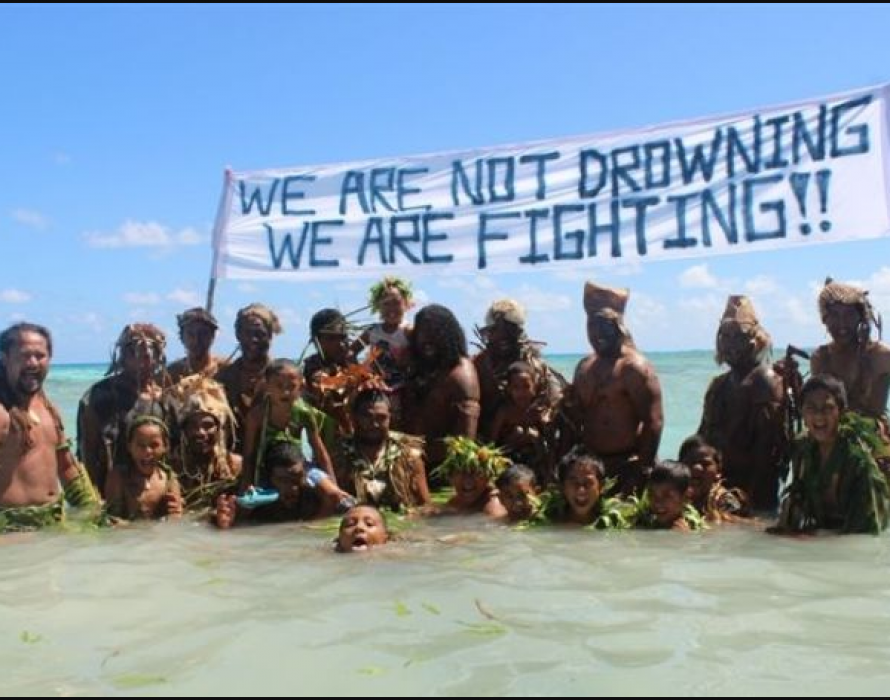
VANGUARD - Expressing the viewpoint of the Communist Party of Australia (Marxist-Leninist)
For National Independence and Socialism • www.cpaml.org
Above: People of Tuvalu protest Australia's indifference to global warming in 2019
Concerns arising about the new government of Tuvalu led by incoming Prime Minister Feleti Teo switching diplomatic ties from Taiwan to China appear to have been resolved, at least for the time being. A diplomatic note from Taiwan's ambassador to Tuvalu stated he had assurance ties with Taipei would be maintained in line with existing defence and security provision. While Tuvalu is a tiny Pacific Island country, it has important geo-strategic significance for US-led regional diplomacy and Taiwan.
In late February the Taiwanese Ambassador to Tuvalu issued a brief diplomatic statement that the incoming government of Prime Minister Feleti Teo in Funafuti would continue to maintain existing links with Taiwan. Concerns had arisen about a possible diplomatic switch to China, following a statement from former Finance Minister, Seve Paeniu, that 'Tuvalu's new government … would review … its Taiwan ties'. (1)
Tuvalu, a small country strategically placed in the Pacific has, historically, maintained full diplomatic ties with Taipei in return for a 'large assistance program'. (2)
Tuvalu achieved independence in the mid-1970s and although it has low levels of economic development, its membership of the British Commonwealth, the Pacific Islands Forum (PIF), together with a treaty of friendship with the US, nevertheless, have shown its vital strategic importance for regional western military and security provision.
Its security pact with Australia, likewise, has revealed its continued significance for Canberra. (3) The Falepili Union, signed last year, allowed for increased migration to Australia, while surrendering veto power over Tuvalu's security arrangements to Canberra. Tuvalu still broadly supports the deal but wants to make changes it says will make the arrangement more "workable" and will safeguard the "integrity of the sovereignty" of the country. Its decision to revisit the pact has dealt a blow to Australia's signature foreign policy initiative in the Pacific. (4)
A major issue arising during recent election campaigning during the New Year was climate change and the very real fear Tuvalu could eventually submerge with rising sea-levels in a few decades. The offer by China, therefore, to create artificial island projects to protect Tuvalu from submerging was taken very seriously by the peoples of Tuvalu. (5) While China's offer was eventually not accepted, the problem, nevertheless, remains unresolved.
In fact, informed opinion has already noted it was too early to expect the Teo administration to categorically maintain its ties with Taiwan, thereby creating continued disquiet amongst those linked to US-led militaryand security provision. (6)
Studies of Tuvalu reveal little about the role of US-led regional diplomacy, which in itself may be an indication of its highly sensitive nature. The US Department of State, however, acknowledge Tuvalu is part of its Indo-Pacific Strategy (IPS). (7) The IPS is based on the global alliance established between the US and Japan, which, in turn, rests upon the Quad. (8) Tuvalu is situated approximately in the centre of the Quad and also strategically-placed at the inter-section of the equator and International Time/Date line. (9)
As Tuvalu also rests on an arc from sensitive signals facilities in Queensland, it would appear an important part of US-led regional military and security provision, particularly for the South and Western Pacific.
The Quad is also composed of numerous lower-level partners inside the main alliance, and Tuvalu would appear part of the regional IPS provision. Part of the US-led IPS strategy has been to build an anti-China missile network along sensitive island chains, used to restrict access and egress of adversaries across the vast region. (10) The geographical, political and diplomatic position of Taiwan is, furthermore, central to the US-led Island Chain Theory.
1. Tuvalu PM 'rock solid with Taiwan', Australian, 27 February 2024.
2. Tuvalu, GlobalSecurity.org – March 2024.
3. Pact with Tuvalu in the balance, Editorial, Australian, 30 January 2024.
4. Tuvalu's new prime minister indicates he will revisit deal…, ABC News, 28 February, 2024
5. See: Fears of Tuvalu turn to China, The Weekend Australian, 20-21 January 2024.
6. Australian, op.cit., 27 February 2024.
7. US Relations with Tuvalu, Website: US Department of State, 23 June 2023.
8. The reasons behind Washington's push for GSOMIA., Hankyoreh, 12 November 2019.
9. Ibid., and, See: Peter Projection, World Map, Actual Size.
10. See: US to build anti-China missile network along first island chain, Nikkei, 5 March 2021; and, US Indo-Pacific Command proposes new missile capabilities to deter China, RFA., 5 March 2021.